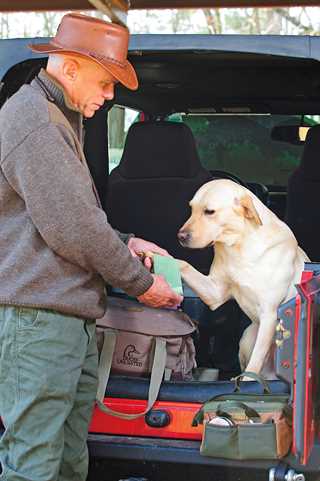Retriever First Aid
Preparation, intuition, and a well-stocked first-aid kit can go a long way toward protecting your dog in the field
Preparation, intuition, and a well-stocked first-aid kit can go a long way toward protecting your dog in the field

By Tom Davis
As any seasoned waterfowler knows, when it comes to enjoying a hunt, safety should be job one. But the need for caution is not limited to obvious hazards such as boating or handling firearms. Indeed, one of our greatest responsibilities as sportsmen is to ensure the safety of our canine companions in the field.
According to veterinarian Dr. Lynn Tedrow, a crucial component of retriever safety is simply getting your dog in shape prior to hunting season. "It's an example of that adage about an ounce of prevention being worth a pound of cure," says Tedrow, who practices at the Animal Clinic of Pierre in South Dakota's capital city. "A dog that's in good condition is much less susceptible to joint injuries and muscle strains. He'll also be better able to cope with extreme environmental conditions, whether it's early-season heat or late-season cold."
Once the season begins, every dog owner should carry a basic first-aid kit for dealing with common injuries and illnesses encountered while hunting. When I asked Tedrow to put together her list of suggested supplies, one notable omission was a surgical stapler, an item that is included in many commercially available first-aid kits.
"In my opinion a stapler gives dog owners a false sense of security," Tedrow explains. "All too often they'll rush to staple a wound closed without cleaning it properly, and it's far better to leave a wound open to drain than to close it with contamination present. Sutures are also more comfortable than staples, which is why I recommend seeking veterinary attention for lacerations sooner rather than later."
Eye injuries are another area where Tedrow advises erring on the side of caution. "These injuries can go south very quickly," she says, "and if they're not addressed promptly your dog risks losing vision. You should make a habit of examining your dog's eyes at the end of every hunt and flushing out any foreign matter. If he continues to squint or scratch at his eye, get him to a veterinarian as soon as you can."
Heat stroke is always considered an emergency, Tedrow emphasizes, as are severe hypothermia and gastrointestinal distress that is accompanied by lethargy, loss of appetite, and the appearance of being "down."
"If your dog is bright-eyed, wagging his tail, and appears eager and energetic, a little diarrhea or vomiting is nothing to be too concerned about," Tedrow says. "Blood in the stool is another thing that owners tend to overreact to, but it's usually just a normal response to the stress and excitement of hunting. It's when your dog displays these symptoms and appears lethargic and depressed that you have an emergency on your hands."
Tedrow says that much of canine first aid comes down to knowing your dog and using common sense. "The thing you have to remember about hunting dogs is that they're all heart: when they're hurting, they hide it," she explains. "By the time you can see that something's not right, it's really not right. You have to pay attention."

Building a Basic Retriever First-Aid Kit
Following is a list of supplies provided by veterinarian Dr. Lynn Tedrow to help you create a first-aid kit for your hunting dog. However, Tedrow stresses that this list is just a starting point. The items you ultimately carry into the field should be selected in consultation with your veterinarian. You and your vet should also discuss the proper use of any medications, medical instruments, and bandaging materials.
Ducks Unlimited uses cookies to enhance your browsing experience, optimize site functionality, analyze traffic, and deliver personalized advertising through third parties. By continuing to use this site, you agree to our use of cookies. View Privacy Policy